Stuart Millard's Blog, page 3
October 27, 2024
Magic Micro Mission: Gaming TV’s Future Perfect
…
This video first appeared on my Patreon, where subscribers could watch it a month before it landed here. If you’d like to support me for as little as £1 a month, then click here to help provide the world with regular deep dives about weird-bad pop culture, early access to my podcast and videos, and all kinds of other stuff.
There’s over 775,000 words of content, including exclusives that’ll never appear here on the free blog, such as 1970’s British variety-set horror novella, Jangle, and my latest novel, Men of the Loch. Please give my existing books a look too, or if you’re so inclined, sling me a Ko-fi or some PayPal cash.
The Accursed 90s: Craig Charles’s Funky Bunker
…
This video first appeared on my Patreon, where subscribers could watch it a month before it landed here. If you’d like to support me for as little as £1 a month, then click here to help provide the world with regular deep dives about weird-bad pop culture, early access to my podcast and videos, and all kinds of other stuff.
There’s over 775,000 words of content, including exclusives that’ll never appear here on the free blog, such as 1970’s British variety-set horror novella, Jangle, and my latest novel, Men of the Loch. Please give my existing books a look too, or if you’re so inclined, sling me a Ko-fi or some PayPal cash.
Bring Me Sunshine
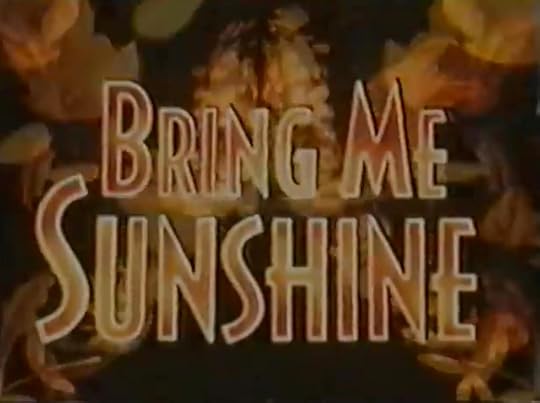
It’s now forty years since we lost Eric Morecambe; a comedian so named after his excitable nature during BBC bukkake parties. Seven months after his death, Thames Television aired a star-packed tribute titled Bring Me Sunshine, held — of course — at the Palladium, which for me, having sat through so many Jim Davidson benefit concerts and Royal Varieties there, is like having my ghost dragged back to the scene of my own murder. Stood outside in a bow tie, Michael Parkinson introduces the show, which is raising money for the Hart Foundation, presumably to help fund their battles against Demolition and the Nasty Boys– sorry, British Heart Foundation. Yes, that makes much more sense.
The Duke of Edinburgh’s there as witness, shaking the hands of various managing directors; men with names like Sir Cyril Clark and Brigadier Thursby-Pelham; men who’ve never had to pick the plastic cover off a microwave meal. Last in line is Eric’s widow, of whom Parky remarks “and she’s looking absolutely smashing!” Calm down, mate, Eric’s barely cold. Anyway, she’ll be watching from the Royal box, so good luck competing with Big Phil. Everyone’s on their feet for the Anthem, in a situation few people will ever experience outside of when the birthday cake’s carried in; having to stand while everyone sings a song about your wife. Think he kept himself amused by mentally reciting his own lyrics? “She has got massive jugs. My God they’re massive ones. God save my wife.”
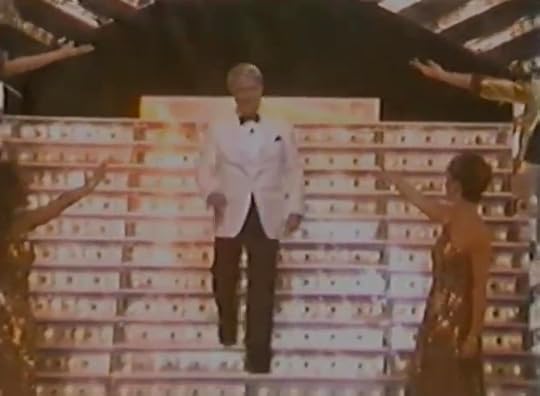
We open with a Broadway style Bring Me Sunshine where gold-jacketed dancers jazzily bop to herald the arrival of Ernie Wise at the top of an illuminated staircase like he’s back from visiting his old pal in the afterlife. An emotional Ernie cuts a rather sad figure through the night, with the sombre appreciative manner of a widower mingling at a wake, and gives a lovely eulogy about their friendship — “two boys met, and they decided to do a double act… one of them isn’t here tonight,” before breaking into song. Max Bygraves comes out to join him, and shockingly — if your sole knowledge of Max comes via the one hand-me-down impression every comic does — he’s not shaking a pair of limp wrists like he found himself without paper towels at a public sink, or voicing his desire to tell you a story.
The boys do self-effacing banter about the old days and Val Parnell; “most acts got a mirror to dress up in, I used a puddle,” and Max goes into a music hall number, boater on his head, jazz-handing it, with reminiscences which have a touch of the Lee Anderson — “there were carousel rides, we had short back and sides, back in those good old days!” The Tiller Girls run in circles and kick their bare legs, once again, a dance that always seems to be saying, “I’ve got a fanny up here, and perhaps on the next kick you shall see it…” (and I will not be made to feel a pervert for saying what we’re all thinking!). Hoofing their way into the wings, the line re-emerges with Angela Rippon on the end, in a call-back to her scandalous appearance on M&W, which was shocking behaviour for a newsreader at the time, though eclipsed a couple of years later when Trevor McDonald did the balloon dance and we all saw his worm.
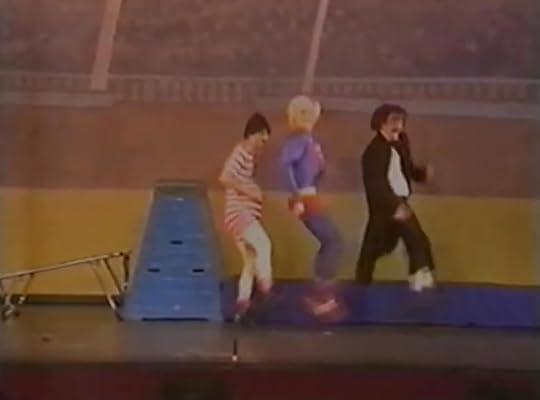
The son of Jimmy James (confusingly named James Casey and not Casey James) does a tribute to Sr’s act, with his cousin Eli Woods and Roy Castle. Casey smokes a cigarette throughout, Eli confuses the words guitar and catarrh, Boy George is “neither one thing nor the other,” and there’s a gag implying Eli will stick a trumpet up his arse. This is pure Music Hall, every joke misunderstood wordplay, plus an allusion to people from Peking as ‘nips’, and the surprising origin of Danny Baker’s “I’ll stop you going to those youth clubs” catchphrase.
Max then introduces The Half Wits, a load of lads in fancy dress doing somersaults and cymbal-crashing falls over on a trampette, who I assumed to be the oft-seen-on-here Acromaniacs under a different name. However, unless someone with greater knowledge can put me straight, this seems not to be the case, and that The Half Wits and Acromaniacs were two different (albeit completely identical) acts, with a potential third group called The Dingbats further muddying the waters. Is this a Bucks Fizz situation, where a split resulted in multiple groups, or just a boom period for troupes of men dressed as policemen and superheroes and Groucho Marx rapidly launching themselves over a hobby horse onto blue PE mats over the sound of slide whistles?
So far, the entertainment’s all very 1900’s, so thank goodness when Max announces “and now ladies and gentlemen, someone from the young generation… Jim Davidson!” I’ve literally seen Jimbo perform on that stage more times than anyone’s told me they love me (though the same is true of Bible John’s Palladium appearances). Jimbo opens with a very young-person greeting of “alright?” and then “as you know, I’m just back from the Falklands…” No, I’ve never heard you talk about it. This is a distinctly less foul-mouthed routine than those from Aids both Gulf and Ferry, with digs at Paul Daniels, and judicious use of the Chalky voice, first in his famous bit about asking for directions, with the punchline “I said thank you very much, officer,” which gets the night’s biggest laugh so far. A black policeman!! Wish they’d cut to Phil at this point. He must’ve been getting a butler to slap his thigh for him. The OBE is cemented with a Chinese restaurant routine — “I said ‘this chicken’s rubbery’, he said ‘fank you velly much!’” And in closing, “Chalky was gonna be here tonight, but he couldn’t get out of bed, someone put Velcro on the headboard,” which is a lovely tribute to Eric Morecambe.
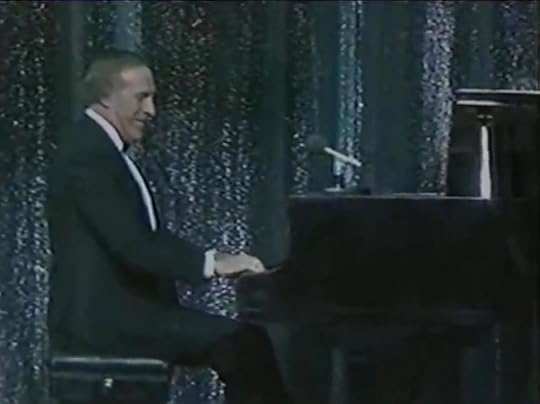
In the other side of the light-ent mirror, Leslie Crowther does Eric’s paper bag trick with Ernie, getting Philip to throw an imaginary coin down from the box. At no point during the many one-sided interactions with The Duke do cameras show him, as he’s undoubtedly sat stony faced like a dad refusing to clap along at a panto, muttering under his quail-breath. When the stage begins revolving to the Sunday Night at the London Palladium theme, atop a silver stair, Brucie bids us good evening, and I feel like I’ve come home. Pronouncing it pi-ahh-no, he tickles the ivories for a rare earnest recital, though you kinda want him to go all Jerry Lee Lewis and start running down the length of the keys with his chin.
There’s a terrific bit of business involving a brutish stage-hand replacing a piano stool with a much taller one, causing Bruce to adopt a toes-out semi-Thinker pose while playing, before tap dancing across the stage, which leaves me pondering the sheer speed at which I’d divorce the most beautiful woman in the world if she said something bad about Brucie. Musical numbers continue; Petula Clark in a billowing dress, Brucie in smoking jacket as Noel Coward; Dickie Henderson, doing an off-key singer routine like a vocal Les Dawson piano; Bertice Reading accompanied by Kenny Ball and his jazz band. If Kenny’s not wearing a wig, he should sue his barber.
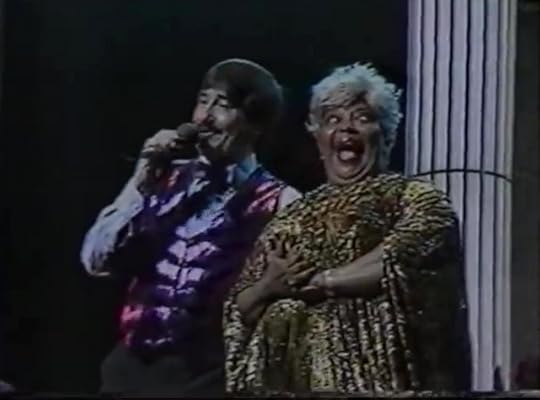
Into this Art Deco Great Gatsby setting, Ernie introduces former guests from The Morecambe and Wise Show, entering like couples into a fancy ball, hand in hand, announced by a doorman. These are interesting pairings if you imagine them as lovers. Fulton Mackay and Nanette Newman, Michael Aspel and Lulu, Dickie Davies and Angela Rippon — oh, the shapes they could make together. They don’t get to speak, merely sashaying down to kiss Ernie or shake his hand. But the greatest of all “what if they done it?!” couplets come with a song and dance to All That Jazz by Lionel Blair and Suzanne (Carry On Emmannuelle; The Boys in Blue) Danielle, whose simmering eroticism is so off the charts, you barely have to imagine it. Slightly less so when Wayne Sleep and Cherie Gillespie do a turn, mind.
Tarby opens the second half, winning applause merely by witheringly shaking his head and mentioning the name Scargill. “Is that his own hair?” he asks, which is a bit rich considering the Lego-man bouf balanced on his bonce. He’s mostly there to introduce “a man who conquered America with British comedy.” True Identity‘s Lenny Henry?! Surprisingly, it’s Benny Hill, who looks more alone than the grieving Ernie Wise, all by himself with no little bald fella to slap, nor young nurses in bras and knickers. It’s strange seeing him do character stand-up, dressed as a headmaster behind a lectern for a school assembly routine, which includes a joke I loved as a kid but didn’t really understand “What is a Hebrew? A male tea bag.” It’s mostly a version of the Rowan Atkinson ‘reading off the register’ bit, with names like Hugh F. O., Little Willy, and Large (pause for comic effect) Richard. Though Benny can’t be arsed sticking to the format, having you believe kids are called things like Steel Helmet, Smelly B. O. and Smelly P. U.. Going on far too long, the audience are unable to offer more than polite laughter as Benny crams in every weak name-pun he can think of, like North C. and Ship Rex, which could’ve been a Garbage Pail Kid. Then he reads out a lengthy poem where the Ps and Fs have been switched, which isn’t good enough to grace Ronnie Barker’s bin, and mostly seems to bemuse a restless crowd — “she could see that he was peeling paint…” I’m curious if Benny ran into Jim backstage, considering seven years later he’d do the comedian’s equivalent of dropping a diss track on Des O’Connor Tonight.
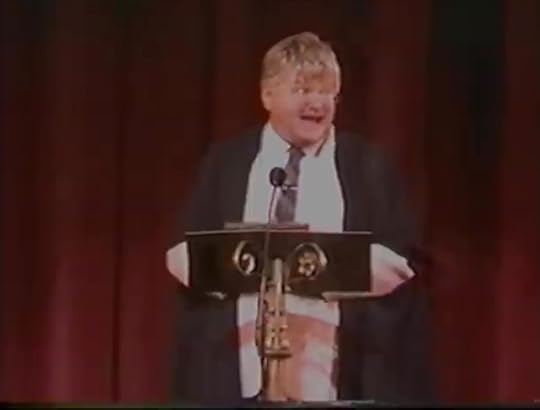
We’re gonna need something big to bounce back from that. What’s that, Ernie; “two fellas who are packing the theatres all over the country”?! This could go one of two ways, and it’s not Syd ‘n’ Eddie who emerge into the light, but Bobby and Tommy, immediately into an argument as a brace gets twanged. Reliable. Dependable. “Look who’s over there, Tom, Raquel Welch. Oh no, it’s two bald headed men sat together.” But their set about Bobby’s failure with women (“I just can’t pull a bird”) doesn’t work so well when you’ve sat through their gospel show and heard how he was banging away on a different groupie every night, his little afro wobbling back and forth, tash all sweaty. Hell, this show pre-dates his Born Again conversion, so poor Ernie Wise probably had to squeeze past as he gave it to a lucky dancer up against the cold wall of the Palladium wings. As Tom pretends to be a lass so Bob can practise his chat-up lines, he gets called a “woolly woofter,” and as a treat, they sing Together We’ll Be Okay, which has unironically become my favourite song, even though every time I mention or think about it, it torments my brain twenty-four hours a day for months.
The final act opens with Ernie in a Princeton sweater amid sock-hoppin’ bip-boppin’ 1950’s dancers and Bonnie Langford. Mike Yarwood demonstrates a beautiful impressionist’s pirouette as he transforms with a “let’s hear from this gentlemen,” leaving, in his place behind the mic, a “hello, good evening, and welcome.” He’s less nervous than at Gulf Aid, but gets a much more muted response than Jim’s Chalky stuff did — “also today, 300 people queued at Patrick Moore. They thought he was a jumble sale.” Still, with big crowds and no re-takes, that stage fright never seems to be far away, messing up his lines badly as Ronald Reagan, though playing it off well by hanging a hat on it as one of Reagan’s blunders. But the accent seems to go and he keeps stumbling. And then, the arms go stiff, the corners of the mouth turn downwards, and Prince Charles is with us.
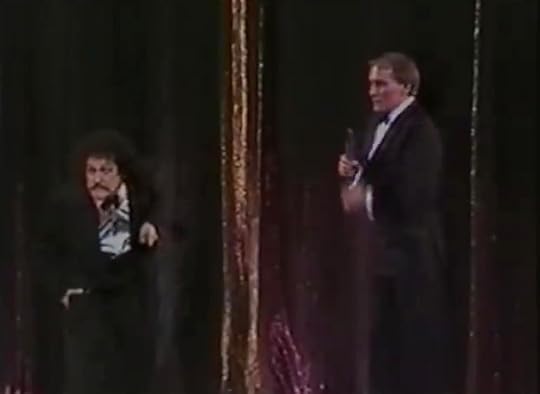
Eric’s perennial punchline, Des O’Connor, does an impression of the pair, seeming to use an accent both Irish and American, confirming all their digs about him being rubbish, but provides the night’s most moving moment, telling us he saw all the Christmas decs on Regents Street while driving in, and it dawned on him that “the brightest light has gone out on the Christmas tree.” He does a heartfelt number which thanks Eric for the memories of relentless piss-taking, as if to tempt his spirit from the wings to crack one final zinger — “they’ll never be another youuuuuu!” Elaine Page finishes us off with Midnight, and it’s felt very odd to get through one of these with no Michael Ball or tribute to The Magic of Disney.
Ernie’s out last for the curtain call as Parky gives a closing speech, where they can’t find the cheque, everyone accusing each other, and for a brief moment, I imagine Prince Philip will bring it out before bounding offstage with the Bring Me Sunshine dance. However, it’s in Ernie’s wallet, and disappointingly, even though there’s £151,000 on it, it’s just a regular sized cheque, and not one of those Royal Variety ones you could slide down a hill on. We do see the royal handshakes though, with the sole beat of tension what’s going to happen when Phil gets to Bertice Reading, the show’s lone non-white performer, but if it happened, we don’t see it, so perhaps he scarpered before reaching that end of the line. At least we have a splendid turn of phrase from the commentator, succinctly summing up British light entertainment with “Dickie Henderson, he does a lot of work for charity.”
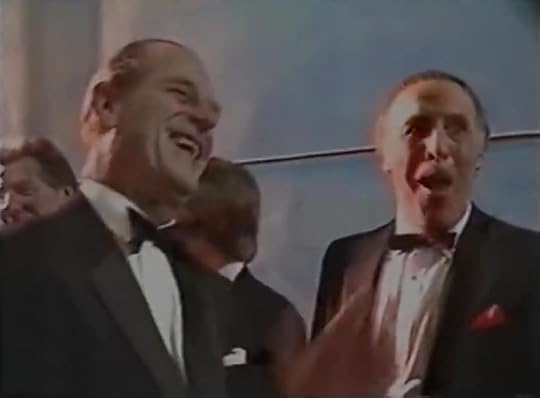
The final word’s left to Ernie, and if Eric had been there, he’d have asked “what do you think of it so far?” to which the audience reply as one “rubbish!” For once, they kinda have a point, and with its disjointed focus on the time periods before he was born, anyone who hasn’t heard of Eric Morecambe is going to assume he was some kind of long-dead jazz man. If he was indeed, as inferred throughout, looking down on them, most probably he gave it a polite ten minutes before asking God to switch the channel to something less weird and depressing, like a live-feed of famine.
…
This piece first appeared on my Patreon, where subscribers could read it a month before it landed here. If you’d like to support me for as little as £1 a month, then click here to help provide the world with regular deep dives about weird-bad pop culture, early access to my videos, my podcast, and all kinds of other stuff.
There’s a ton of content, including exclusives that’ll never appear here on the free blog, such as 1970’s British variety-set horror novella, Jangle, and my latest novel, Men of the Loch. Please give my existing books a look too, or if you’re so inclined, sling me a Ko-fi or some PayPal cash.
September 30, 2024
Forgotten Kids Shows: The Old Man, the Door and the Swine
…
This video first appeared on my Patreon, where subscribers could watch it a month before it landed here. If you’d like to support me for as little as £1 a month, then click here to help provide the world with regular deep dives about weird-bad pop culture, early access to my podcast and videos, and all kinds of other stuff.
There’s over 775,000 words of content, including exclusives that’ll never appear here on the free blog, such as 1970’s British variety-set horror novella, Jangle, and my latest novel, Men of the Loch. Please give my existing books a look too, or if you’re so inclined, sling me a Ko-fi or some PayPal cash.
G’s, Gurus and Bonus Points: The Time-Wasting of Gamezville
…
This video first appeared on my Patreon, where subscribers could watch it a month before it landed here. If you’d like to support me for as little as £1 a month, then click here to help provide the world with regular deep dives about weird-bad pop culture, early access to my podcast and videos, and all kinds of other stuff.
There’s over 775,000 words of content, including exclusives that’ll never appear here on the free blog, such as 1970’s British variety-set horror novella, Jangle, and my latest novel, Men of the Loch. Please give my existing books a look too, or if you’re so inclined, sling me a Ko-fi or some PayPal cash.
September 24, 2024
Andy Capp
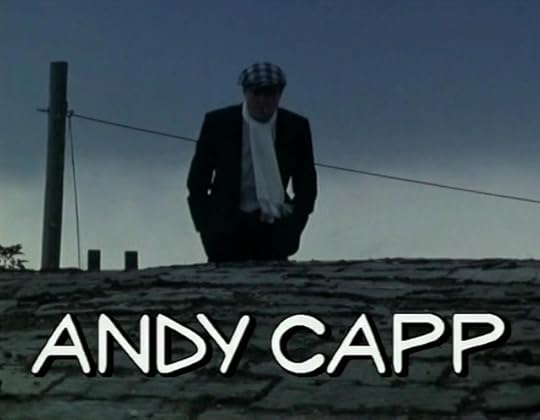
[This is Part 12 of my Shitcoms series. Part One — Part Two — Part Three — Part Four — Part Five — Part Six — Part Seven — Part Eight — Part Nine — Part Ten — Part Eleven]
Since the MCU took comics mainstream, in the mad rush to bring every forgotten minor character to screen, one sub-genre got completely ignored; the syndicated newspaper strip. Where Americans were treated to Peanuts, Nancy, and Calvin and Hobbes, readers of British tabloids had stuff like Amanda, Hagar the Horrible, and George and Lynne; a strip with so much needless female nudity, it seemed the artist was drawing it in rushed rehydration breaks during one continuous wank. Generally read by men who open a newspaper at the back page, Britain’s most successful daily strip was Andy Capp.
Nominative determinism at play, a flat-capped capital-N Northerner, Capp was every working class cliché, as a workshy boozing gadabout, practically living in the pub/bookies to escape from the missus; a nagging charwoman forever chasing him with a concussion-giving rolling pin. I had a book of collected strips as a kid, and didn’t really understand them beyond “haha, he hates his wife!” but even then, this felt a very grim window into what possible future awaited me, sat in the corner of the local, hiding from the old ball and chain, and concocting various failed schemes for cobbling together enough cash to keep the bailiffs from the door for another week.

For something so region-specific, the syndicated Andy Capp found surprising success in America, established enough to have appeared twice in — of all places — Family Guy; in one cameo performing a ‘Capp smear’ on Lois, who’s got her legs in stirrups. Andy Capp’s, a brand of crisp, were introduced to American mouths in 1971, and are still available today, with a new flavour (Andy’s Fire Fries) debuting as recently as last November. This is just one of many spin-offs, including a terrible ZX Spectrum-era computer game, and a 1970’s stage musical, with Tom Courtenay in the lead and songs co-written by Trevor Peacock. There was a West End cast recording released in ’82, and even a 2016 London reprisal. One forgotten connection is that Buster from the comic Buster‘s full name is Buster Capp, as he’s Andy’s son, though it’s never been acknowledged in the newspaper version. But best known in the Capp oeuvre, because of its appalling quality, is the 1988 sitcom.
Written by Keith Waterhouse, who was behind the Worzel Gummidge series, and directed by John Howard Davis, who’d been Oliver in David Lean’s 1948 Oliver Twist, the famous cap was plonked on the dependable, and more importantly, northern head of James Bolam. In the late 80s, newspapers occupied the same role as waking up and checking your social media. Everyone read a paper, with the choice of title a political statement about which class you occupied. Were you a well-to-do Telegraph reader, or a man of the people, laying the Sun or Mirror across your bare thighs while making tud? Capp was found in the Daily Mirror, giving him a head-start ratings wise, with a huge in-built audience and brand recognition. However, the transition to television meant figuring out the formula for turning a four panel strip (just a single panel in the early days) into a half-hour format. Weirdly, this is both the only thing that really works, and the reason Andy Capp is so dreadful.
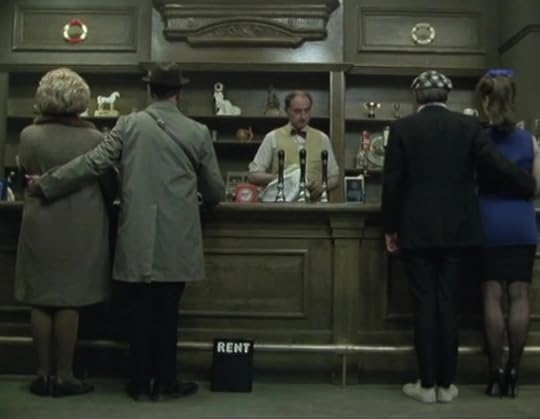
To me, an extremely Southern man of the beach, a north I’d only ever seen on television seemed particularly bleak, where people in long overcoats struggled up hilly cobbled streets past women in headscarves scrubbing their front steps, a backdrop of factory smoke, whippets, and black pudding, and chimney stacks rising into overcast skies. If the sun ever came out on a northern-set show, I don’t recall it. Although I should clarify, as far as I’m concerned, London is the north, and anything further inland than two miles from the south coast is where the Wildings live. This sense of desolation is captured perfectly by the opening to Andy Capp‘s first episode, Bolam’s cap cresting over a sloping road, hands in pockets, staggering bandy-legged, and backed by the sort of mournful trumpet which usually accompanies a clown bursting into tears. From atop a bridge, Andy spots Tosh Lines off The Bill, who’s chest deep in a foggy canal. “Morning Walter,” calls Andy, half of his mouth keeping hold of a roll-up, “you alright, kidder?” This sets the tone, and already, I feel a monumental depression sliding over my head like a binbag.
One of those cheery comic strips about two people trapped in an unhappy and violent marriage, ITV’s Capp was filmed on location, multi-cam, with no audience nor laughter, which in 1988, must’ve given the air of a comedy-drama, at best. Flo Capp is played by Paula Tillbrook, aka 90’s Emmerdale Farm busybody, Betty Eagleton, and her first scene is a neat encapsulation of all her scenes, hair in rollers, thrusting an alarm clock in Andy’s face with a “What time d’ya call this?!” to which he retorts “Oh, shuddup, woman!” before dragging himself upstairs to bed as she threatens to leave him. Reader, get used to that.

Immediately, it’s genuinely impressive how well they’ve replicated the feel of the strip, in a way few — if any — adaptations have managed before or since. Characters all have simple costume designs; Flo with green headscarf and blue cardie, Andy with his trademark hat and scarf; though they should’ve gone the whole hog and left Bolam only visible from the nose down. Everyone’s identifiable by silhouette alone, as indeed they’re sometimes seen, behind doors and windows, and it’s all very cartoonish. The council landlord’s a stern-faced, Hitler-tashed chap clutching a black book with RENT on it in large white letters, while the debt collector swings a bag bearing DEBT COLLECTOR as he strides towards the Capp residence. Tool boxes have TOOLS written on the side, and Flo cooks breakfast in a chef’s hat so enormous, even the Chuckle Brothers would’ve told the costume department to tone it down a bit.
The front of buildings fill the screen exactly as they would in a newspaper panel; the Capp’s terraced house, bookies, pawn brokers, pub; for characters to traipse in front of with a cartoonish gait, Flo to drag Andy back home on his arse by the collar, or him to get chased by debt collectors, everyone exaggeratedly knees-up jogging at the exact same speed. Framing’s lifted straight off the page; the backs of couples stood at the bar, barman in the middle, as we hear their dialogue as if in speech bubbles. Wives sit on first floor windowsills, chatting while they clean the glass. The camera’s often stationary, or with simple back-and-forth pans, to give the feel of a comic, while all the many ‘walking along the pavement’ shots are done wide and from the side. The forth wall is practically non-existent, through which characters address us with little asides, and a third of the dialogue’s aimed straight at us, delivering their bon mots as they would’ve done to readers in the Mirror.

But this isn’t a newspaper; it’s telly, and you can’t fill 24 minutes a week with nifty cinematography alone. Episode one’s got a loose plot about Andy wanting to change his ways or else Flo will leave him, taking a vow to be a different man, doing the housework and “I’ll even stop wearing me cap in bed!” But once he’s ceased all the mucking about, and even sold the TV to take her to the cinema, Flo now finds him too dull, dragging him to a marriage guidance counsellor, whose suggestion that Andy get a job has him running through the exit at door-shattering speed. And like that, he’s back to his old ways, getting Jazzy Jeffed out of the pub, and waddling home to find Flo waiting with a rolling pin. “Oh, it’s lovely to have him back, but don’t say anything,” she tells us, before conking him over the head, where we hear the chirp of birds, as Bolam tips stiffly out of frame with a thump. At the very end, Flo bids us “see you next week!” and just imagine getting your parasocial relationships from Andy Capp. (Has anyone ever told me they loved me? Of course; Adam Buxton at the end of every podcast!)
The tragic denouement of episode one is the admission they’re both aware of playing their part in this marital war, and the plot’s whole ‘without the battle, what’s the point?’ revelation kinda ruins the rest of the series, where they’re living out the same cycle of threats and abuse. At least it looks good, with its drab olive colour pallet, though it’s unclear what year this is meant to be. The vehicles, fashions and décor are all 1950’s, the policeman wears a cape, and there’s no denim to be seen, seemingly setting us firmly in the early post-war years. Their telly is distinctly a 50’s model, and Andy washes in a tin bath in the living room, filled with water boiled in a kettle on the stove. But then Flo references the last time Andy took her to the pictures — back in 1981 — suggesting it’s set the year of release. Perhaps this is simply what the north was like back then, spoken as an southerner who was busy roller-skating round with my Walkman. Then, when Andy takes Flo to the cinema, she names the film they went to see as Rocky IV, placing us at the beginning of 1986. Even the existence of Stallone in this world feels hugely out of place, yet fits perfectly with the comic counterpart, running for decades with nobody aging or changing their look, but still throwing in the occasional contemporary reference.
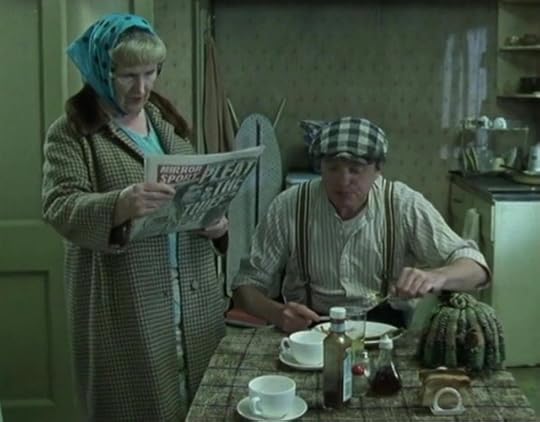
I have to be honest, one episode in, my initial sense was that Andy Capp‘s far more interesting than it is notably bad. This’ll change. The second episode revolves around his obsession with sport, mostly (as with all men in the series) as an excuse to get away from the missus. When he’s talking to his racing pigeon, he shuts Flo up by stuffing her gob with clothes pegs, and left to clean pigeon poo off all manner of enraged locals’ clothes and bikes, Flo once again threatens to leave. She starts playing him at his own game, doing bets at the bookies, joining the opposing darts team under a domino mask as The Masked Marvel, and taking up football. He does not change. She does not leave.
There’s a moment here where Andy’s playing darts, chucking them offscreen, and it cuts to all the debt collectors, angrily drumming their fingers on a table, each with a dart sticking out of their hats. It’s a perfect three-panel gag, and likely a direct adaptation from the strip. These comic moments are Andy Capp‘s strength, and its downfall. The sight of him traipsing back from the canal with a fishing rod over his shoulder, still-hooked fish swinging from the line is delightful, like being presented a big pile of mash with sausages sticking out for your tea. Characters talk in annoyed growls, audibly gulp when afraid; after a thumping, have black eyes like they’ve been pranked with a telescope; and stand frozen in the back of frame until it’s time to be involved in the scene and suddenly come to life.
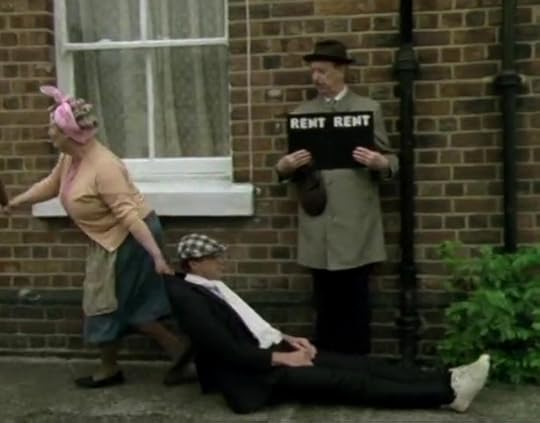
But Andy Capp the newspaper strip is thin, repetitive gruel, even over four daily panels, and laid bare over half hours, starts to feel like when it’s 4am and you’ve been laid awake with the same 10-second blast of music reverberating around your brain (usually the Peanuts music from Shooting Stars). Perhaps it’s different when playing out over six months of Daily Mirrors, but here you’re forced to mainline the same few plot devices in a maddening loop. Andy’s arsehole behaviour — “boozin’, cadgin’, womanizin‘” — striking a match on Flo’s arse as she hammers down the lino, so coddled, she blows on his tea for him; and her threatening to leave, suitcase packed once more. Pacing wise, it’s basically a sketch show, restlessly jumping from scene to scene, structure rarely able to hold more than a few exchanges before the weak punchline. It’s torn between very wordy back-and-forths, and visual gags; such as Andy staggering home drunk, falling in a canal out-of-frame, and a load of water splashing over a policeman, who says to camera “every town has one, you know.” It’s not really a sitcom, but a collection of short comic strips, like those books I didn’t understand as a child. Consequently, you’re often missing the big resolution of normal sitcoms right before the credits, as most scenes, lifted from the page, have their own endings.
Incidentally, that policeman’s played by the hunky vicar from Keeping Up Appearances, while the bookie’s the dad from Beadle’s Beginner’s Guide to Practical Joking. The cast is packed with familiar (and northern) comedy players, each unable to save the show from itself. Episode two’s end credits do reveal lyrics to the dour theme, sung by a man with a Geoff from Byker Grove accent — “Well, it’s great round here, and the beer’s good too, with a snooker hall close by; there’s fish in the river and birds in the pub, you can catch both if you try…” Episode three revolves around Flo wanting a new dress for an engagement party, and Andy literally thrown out of the house again — “I wonder if you need planning permission for a safety net strung between two lampposts?” He also falls down an open manhole while reading the paper (Mirror, of course). In the next episode, He’s home blotto from the pub, causing Flo to pack her bags and threaten to leave. Then she’s back, and he’s thrown out. He’s back by the end, status quo in place, and then they both threaten to leave, “Goodbye for good!” “If not, flipping sooner!” but are straight back in the front door, screaming at each other.
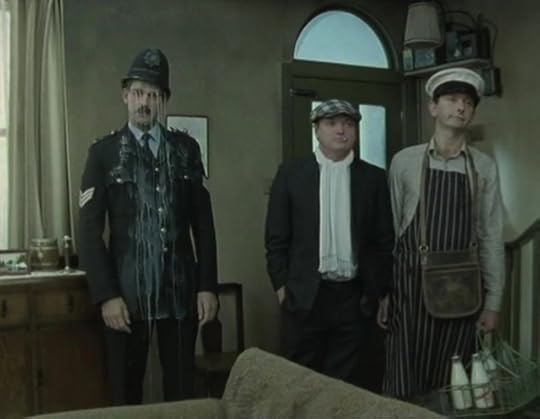
I’m light-headed by episode five, as Andy vows to change his ways after the bailiffs take all their stuff. It’s just white noise now, and I’ve gone from thinking “this is nowhere near as bad as I was led to believe” to “would a fall from this height be enough to kill me?” There’s a mother-in-law who exists only as a shouting voice through a front door, and another obvious comic-lift, where final demands arrive, only to reveal Andy’s put the dustbin under the letterbox to catch them. “Any more bright ideas?” says Flo. In the final episode — Andy Capp did not get a second series — he’s forgotten their wedding anniversary, and gets ganged up on by the entire cast; bookie, pawn shop owner, marriage guidance counsellor, vicar, milkman, Tosh Lines; into making an effort. He blindfolds Flo for a surprise trip, which turns out to be the pub, and says he’ll leave her if she doesn’t go inside. Instead, she marches to the river to kill herself — “this is goodbye!” — but eventually goes in (covered head-to-toe in mud from her suicide attempt) to find the gang set up a surprise party, and here’s to another 25 years of comedy domestic violence between two people who despise each other. If Andy Capp is viewed as an experiment in bringing a comic to screen as directly as possible, it proves that you definitely can, but also definitely shouldn’t. I think I’d rather have been watching an adaptation of bulletins about war atrocities.
…
This piece first appeared on my Patreon, where subscribers could read it a month before it landed here. If you’d like to support me for as little as £1 a month, then click here to help provide the world with regular deep dives about weird-bad pop culture, early access to my videos, my podcast, and all kinds of other stuff.
There’s a ton of content, including exclusives that’ll never appear here on the free blog, such as 1970’s British variety-set horror novella, Jangle, and my latest novel, Men of the Loch. Please give my existing books a look too, or if you’re so inclined, sling me a Ko-fi or some PayPal cash.
August 31, 2024
Saturday Stayback: When Tiswas Went to the Pub
…
This video first appeared on my Patreon, where subscribers could watch it a month before it landed here. If you’d like to support me for as little as £1 a month, then click here to help provide the world with regular deep dives about weird-bad pop culture, early access to my podcast and videos, and all kinds of other stuff.
There’s over 775,000 words of content, including exclusives that’ll never appear here on the free blog, such as 1970’s British variety-set horror novella, Jangle, and my latest novel, Men of the Loch. Please give my existing books a look too, or if you’re so inclined, sling me a Ko-fi or some PayPal cash.
The Great Egg Race: We Used to Make Stuff
…
This video first appeared on my Patreon, where subscribers could watch it a month before it landed here. If you’d like to support me for as little as £1 a month, then click here to help provide the world with regular deep dives about weird-bad pop culture, early access to my podcast and videos, and all kinds of other stuff.
There’s over 775,000 words of content, including exclusives that’ll never appear here on the free blog, such as 1970’s British variety-set horror novella, Jangle, and my latest novel, Men of the Loch. Please give my existing books a look too, or if you’re so inclined, sling me a Ko-fi or some PayPal cash.
August 20, 2024
Race to the Middle: Lenny Henry’s True Identity

As there’s a million humorous commentators doing the bad movie thing, other than Carry On Emmanuelle, I usually stick to stinky television. But this one is close enough to the wheelhouse to dig into, despite not actually being notably bad, although its premise distinctly falls under the category ‘things that would never be allowed today’. You could be forgiven for not knowing 1991’s True Identity exists, a rarely-if-ever spoken of oddity so tucked away in its star’s CV, if he keeled over tomorrow, in a hundred obituaries, you’d not see its title spoken once.
These days, whenever Sir Lenny Henry’s trending on Twitter — virtually a weekly occurrence — clicking on said trend entirely leads to tweets letting everyone know they never found him funny, and accusing him of stealing a living (on top of ‘stealing’ Comic Relief money by funnelling it to African causes, plus being a massive racist against white people). Funnily, the lists from these men with flags and football teams in their bios, of “so-called” comedians that should see the licence fee cancelled extends from Lenny to Nish Kumar, Romesh Ranganathan, and for a bit of variety, Rosie Jones.
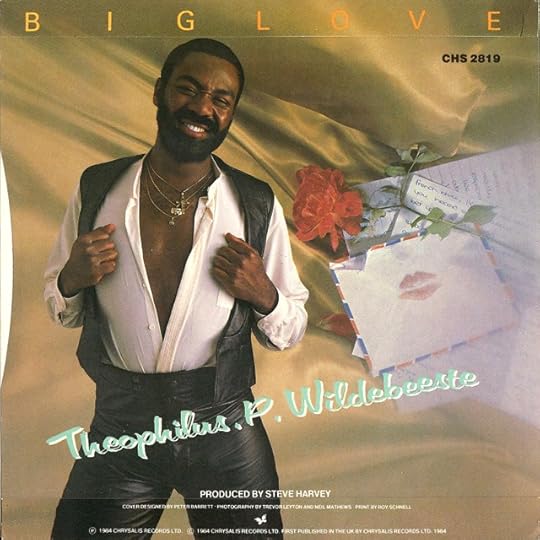
Regardless the opinions of blokes who own the Sinderella box set, nobody can deny Lenny was one of our biggest comedy stars for years. I’ve a vivid memory of a group of us boys gathered round the corner of the playground in a hush, furtively looking at a picture in a mate’s Comic Relief book where Theophilus P. Wildebeeste lay in bed with what appeared to be a foot-long erection poking through the sheets, which the next page revealed was actually a bottle of champagne. When Hollywood inevitably came calling, Lenny signed a three-picture deal with Disney, the first of which was 1991’s True Identity.
That crop of Brit comics had starred in films before, albeit British-made or in smaller, quirky roles; Smith and Jones’s Morons From Outer Space, Mel solo in The Princess Bride, Pamela Stephenson in Superman III, Rowan in The Tall Guy — though I’m sure there are plenty of others readers will pick me up on. But Lenny was the first to front a big Hollywood movie for a major studio, made with American money and set in New York. He wasn’t a complete unknown in the US, with The Lenny Henry Show airing on Bravo, but essentially this was the classic attempt to break America.
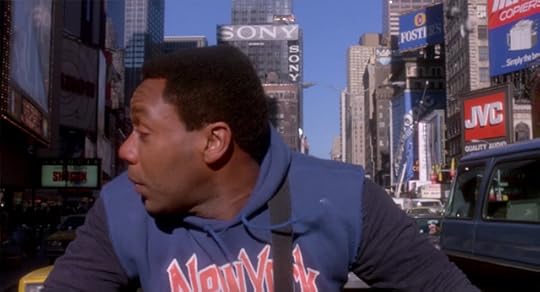
Its opening scene has the always brilliant J.T. Walsh (part of a great cast which includes Michael McKean as Lenny’s agent and Austin Pendleton as a theatre director) leading an FBI SWAT Team in the arrest of mob boss Frank Luchino on his yacht, which promptly explodes, killing Luchino, and leaving Walsh distraught as his big fish escapes justice. Cut to five years later, Lenny Henry’s Miles Pope is in an acting class, doing a deliberately awful American accept in a scene where he’s playing a pimp… oh no, that’s the accent he’s using for the whole film. Told by teacher he’s “not black enough,” he cranks it up to ten, grabbing at his genitals, which the teacher loves; a white man’s idea of how black people should behave, while Miles bemoans the fact every role for black performers is a criminal.
It’s funny to think there was a time ‘Lenny Henry cycling through Times Square’ was a scene in a film and not a title of the latest BBC celebrity travelogue, as Miles stops to wistfully gaze at a poster for Othello, ‘presented by Leland Carver Enterprises’, imagining himself in the role, getting roses lobbed at him. NYC itself looks grimily gorgeous and full of life, the way it used to in movies before they just filmed a tiny bit when nobody was around and filled in the backgrounds using computers. His neighbour is best buddy Duane, a glasses-wearing nerd a full foot shorter than Lenny, and played by True Identity‘s director, Charles Lane. It’s a role he gave himself solely to prevent being fired during the shoot, and his hiring made Disney the last major studio to employ a black director. With the glasses, teeth and mannerisms, Duane’s got a huge David Leibe Hart vibe, and there’s a running gag where he likes bigger women (by 1991 standards, when it was illegal to have a bottom) which is played like a perverse fetish. Duane’s apartment is filled with prosthetic heads, because — as will come into play — he’s a special effects artist.
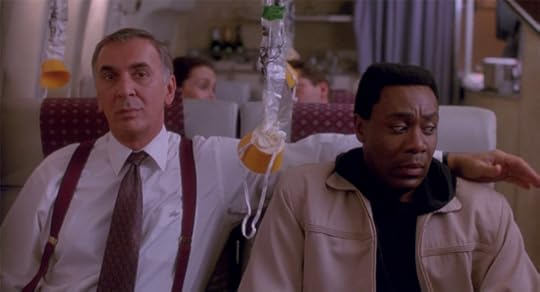
Flying back from playing a raisin in a cereal commercial and fast-talking his way into first class, Beverly Hills Cop style, Miles finds himself sat next to the Leland Carver (Frank Langella), trying (and failing) to wangle an audition for Othello. Waking to find oxygen masks hanging and the other passengers screaming, death is imminent, but Leland, cool as a cucumber, tells him to “shut the fuck up and stop snivelling… die like a man!” and then casually confesses that Frankie Luchino didn’t blow up on a boat; he faked his death and got plastic surgery, taking on the assumed name of Leland Carver. “Well, I’ll see ya in Hell, kid,” he says, right before the pilot gets the plane back under control. This ‘whoops, the plane hasn’t crashed’ confession was later done in Almost Famous and Father Ted, and subverted in the Seinfeld finale, though nothing will top Jimmy Olsen in the 90’s Lois and Clark, tied to a doomsday device with Lois, believing they’re both about to die, and deciding the last thing she should hear is his admission of her starring role in his wet dreams.
Anyway, now Miles knows Leland’s True Identity, he has to be whacked, and with a goon giving chase at the airport, escapes in a taxi, straight to a cop shop where he’s pulled into an identify parade and identified as a flasher. After getting shot at by Leland’s hitman, Miles begs Duane for help making him disappear, which he does using the gimmick of several reality TV experiment shows from the early noughties; race-altering prosthetic make-up. However, there are sadly no scenes of Mike Reid being transformed into a Rastafarian — “you’re a Wilf, mon!”
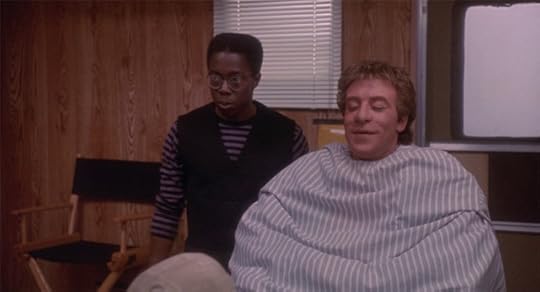
The old race switch story wasn’t new, most notably with Melvin van Peebles’ 1970 film Watermelon Man, where a black actor in whiteface turned black, and there’s a nod to it here with a cameo by Melvin as a cabbie bemoaning “Uncle Toms… their Brooks Brothers suits and all that chemical in their hair,” while Miles literally turns himself Caucasian in the back seat. More infamously, and contemporaneously to True Identity is 1986’s Soul Man, with another white-to-black plot, donning the shoe polish to win an African Americans-only scholarship, but at this point, it’s a dead genre, signing off for good with White Chicks, where the Wayans Brothers got done up in prosthetics not-dissimilar to Lenny’s, to jump onboard the Paris Hilton impressions bandwagon.
Though the viewer’s well aware Lenny Henry spent hours getting it put on every morning before shooting after sitting in one of those molds with straws up his nose, Miles’ disguise is the sort of magic make-up he can take casually apply himself while in the back of a cab, consisting of just a wig, rubber nose and single tiny jar of Caucasian paint. The paint stays perfect even when he’s being punched in the face, and though it covers his hands, doesn’t come off when he touches things. I know it’s a bit Angry YouTube Movie Reviewer to pick apart silly specifics of what’s ‘just a movie’, but it is otherwise grounded, and this isn’t Mission Impossible. As movie make-up, it’s unsettling in that you know it’s somehow not a real face, but still tons better than Gordon Ramsay’s nightmare disguises.
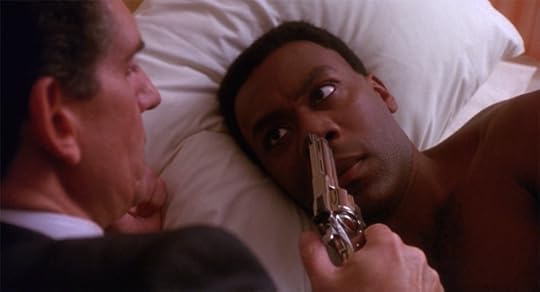
The race-switch premise always makes one take a sharp intake of breath, as it can only ever lead to the embracing of stereotypes. You have to behave like a black man… so how do black men behave? What makes a black person’s walk different from a white person’s? Once Miles whited up, I was expecting a feature-length cover of that Simpsons scene with the stand-up comic — “black people drive like this [drives in a cool way], white people drive like this! [drives in a nerdy way]” But the racial conceit; the whole “you couldn’t do this now, cos of woke!” is barely used, barring when Miles first becomes white and chats to another black man in the street about how us whiteys walk with our butts all tight, and realising it’s easier to hail a cab.
Instead, it’s another “mistaken for a criminal” flick, after the hitman catches him in his apartment, collecting clothes. Noticing Miles’ bare feet are brown, a scuffle ensues where a waterbed gets shot, and the hitman’s fatally electrocuted when a boombox falls on it. From here, it’s your common mistaken identity farce, like something Lionel Blair would be losing his trousers in at the end of Worthing pier, having to pretend he’s the hitman when Leland’s main goon, Anthony, catches him with the corpse (played off as an unlucky witness). Consequently, rather than “how would a white person act in this situation?” it’s all “what would a mob guy say?” and he gives White Miles a Mafioso Sopranos voice after Leland demands a meeting, putting them face to face a mere 40 mins in. Having taken the hitman’s name, White Miles is told to get Black Miles killed, sharpish.
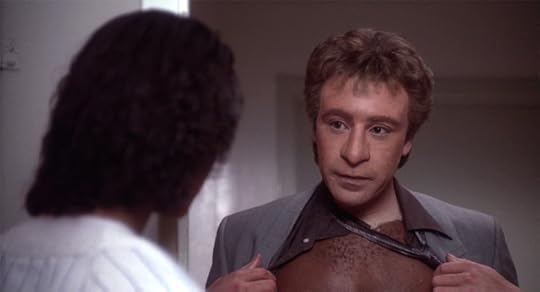
It should also be noted, this is the era when movies had to have a subplot about normal people accidentally crossing drug dealers or the mob — Three Men and a Baby, Crocodile Dundee, Twins — everyone evading criminals and ducking bullets. In the standard romantic plot, just like every film older than a decade, Miles comes across like a creep and a stalker. He first spots Kristi — Leland’s interior designer, a role Lane changed from a maid in the original script — during their initial meeting, and eventually tries to enlist her help in getting evidence for the feds, turning up at her apartment in a Prince-like disguise as ‘James Brown’s brother’. She believes him to be mentally ill, telling him “you’re cute, but call me when you’re better,” and when he knocks again later as White Miles, unbuttoning his shirt to show off a brown chest, as proof that he is not mentally ill, she’s all aboard.
Miles and now-girlfriend Kristi get J.T. Walsh on side, coincidentally right as Miles finally lands the leading role in Leland’s Othello — or at least, understudy, to James Earl Jones. But how, ponders Leland, to flush him out before he testifies for the grand duty? Hard cut to James Earl Jones in a hospital bed with two broken legs and a broken arm after a hit and run. Walsh’s FBI boss R. Lee Ermey tells him they won’t authorise the mission to take down Leland, to which another FBI guy makes this face:
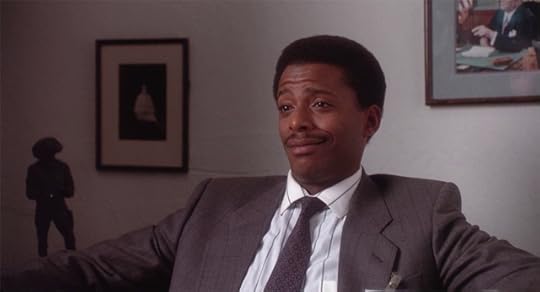
But authorise they do, at the opening night of Othello where our whole cast are in attendance; Leland watching angrily, Michael McKean snoring, hitman with a silencer sneaking about in the rafters above the stage. I wonder if Lenny’s actual debut in Othello was slightly ruined by him remembering “I did this exact scene in that movie which killed my Hollywood career”? During a big speech, Miles seemingly gets shot, but it’s just another of Duane’s special effects, and as he staggers into the audience, still monologuing, ‘dies’ in Leland’s lap, before Walsh comes out and arrests him, and the movie ends with Miles and Kristi off on a dirty vacation together.
If you’re wondering what the other movies are from his three-picture deal, True Identity did so poorly, Disney immediately cancelled Lenny’s contract. Though the film is undoubtedly a failure, there are a handful of genuinely funny moments. Andreas Katsulas as Anthony the Goon steals every scene he’s in, particularly when jumping up and down on a corpse to get it flat enough to close a trunk, while Miles’ funniest bit comes during the plane crash, staggering to the ‘cockpit’ and pulling it open to find only a rack of clothes. “There ain’t no pilot in here, this is just a closet! A fur coat can’t fly a plane!” But these are rare, and they even do a bit I thought I’d jokingly suggest after the ‘brown feet’ scene, like the rascal I am, where White Miles is stood at a urinal and an old man does a double-take, staring down at the black penis, before turning to spray piss everywhere (just audibly; the piss and dicks are below frame).
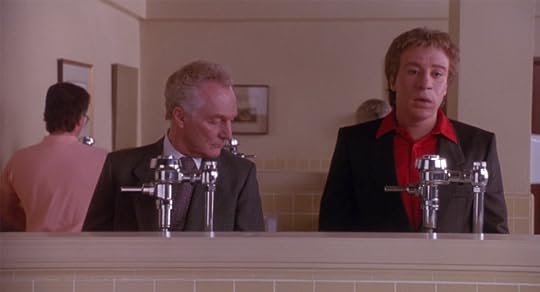
It probably sounds like I’ve been describing a family movie, but even given its sitcom-like tone, True Identity is deservedly R-rated, absolutely riddled with f-bombs and the odd grisly scene, like Duane’s faking of Miles’ death, scattering the apartment with bloody, severed limbs, and the seemingly-decapitated head of Lenny Henry, tongue lolled, poking through the sofa cushion, which a goon declares “fuckin’ beautiful,” before running outside to vomit. Despite how it makes 2024 eyes light up, the most offensive thing about the premise is that they don’t really use it. You’ve got a black director, and a performer well aware of the complexity around black performers who’ve either had to ‘act black’ or assimilate ‘as white’ to survive — with a famous early stint in The Black and White Minstrel Show. Plus, a script which grew out of a sketch the writer penned for Eddie Murphy on SNL, where Murphy whited up to experience life from the other side of the racial divide. All the ingredients of a toothsome satire, yet they choose to sidestep that path entirely.
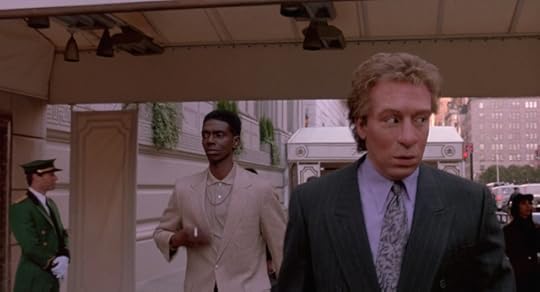
There’s nothing of how the world sees Miles differently depending on whether he’s brown or pink, or the various privileges or disadvantages at play, other than a brief scene of White Miles sharing a cab with a lady who thinks she recognises him from a financial firm, in a sort of American Psycho ‘all white Wall Street jerks are interchangeable’ moment. What we’re left with is an anaemic Some Like It Hot. Aside from Leland’s one-time use of a slur, the most racially charged scene has White Miles nervously hurrying past an alleyway of black and Latino ruffians, threatening him with Beano-level dialogue: “you’ll get hurt round here, white boy!” and “round here, our favourite people definitely ain’t white!” In skirting the obvious angle, True Identity misses opportunities to be both better and much, much worse, landing in this tedious middle area, and if not for everyone saying fuck all the time, this would’ve been quite at home alongside Big and Flight of the Navigator as naff Bank Holiday afternoon fare on BBC1.
…
This piece first appeared on my Patreon, where subscribers could read it a month before it landed here. If you’d like to support me for as little as £1 a month, then click here to help provide the world with regular deep dives about weird-bad pop culture, early access to my videos, my podcast, and all kinds of other stuff.
There’s a ton of content, including exclusives that’ll never appear here on the free blog, such as 1970’s British variety-set horror novella, Jangle, and my latest novel, Men of the Loch. Please give my existing books a look too, or if you’re so inclined, sling me a Ko-fi or some PayPal cash.
July 31, 2024
VHS:WTF Unlucky Dip II
…
This video first appeared on my Patreon, where subscribers could watch it a month before it landed here. If you’d like to support me for as little as £1 a month, then click here to help provide the world with regular deep dives about weird-bad pop culture, early access to my podcast and videos, and all kinds of other stuff.
There’s over 775,000 words of content, including exclusives that’ll never appear here on the free blog, such as 1970’s British variety-set horror novella, Jangle, and my latest novel, Men of the Loch. Please give my existing books a look too, or if you’re so inclined, sling me a Ko-fi or some PayPal cash.



